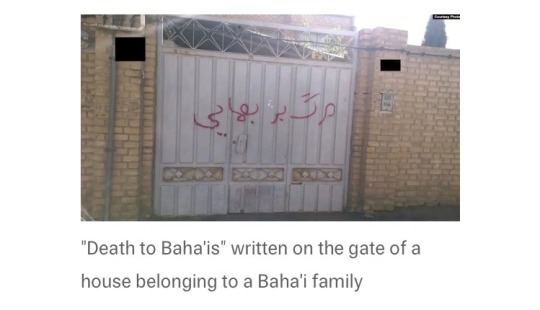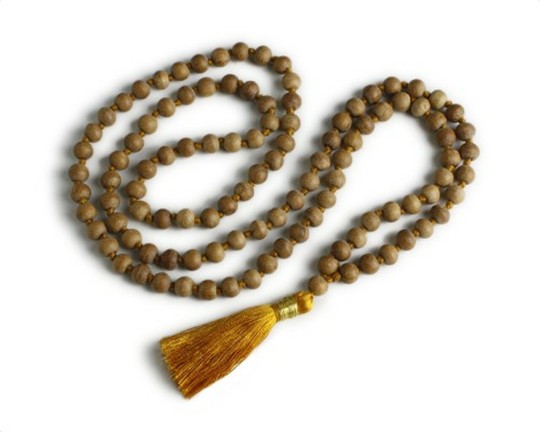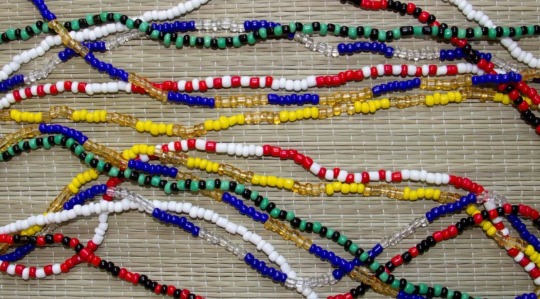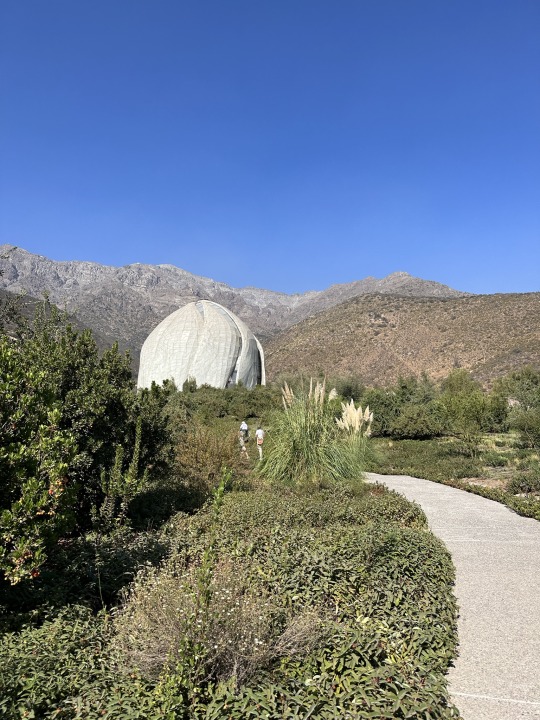#Bahá’í
Explore tagged Tumblr posts
Text

"Bahá'í" added to religion page.
image: a yellow, hollow star with nine points.
#religion#bahá’í#communication symbol#aac symbol#communication image#aac image#aac emoji#custom emoji
14 notes
·
View notes
Text
Pete Haug further explains the religious persecution in Iran of Baha'is.
1 note
·
View note
Text
A former leader of the Iranian Baha’i community says the Islamic Republic gives them no chance of “leading a normal life” on account of their faith.
“For forty-five years, we Baha’is have been constantly disqualified from leading a normal life in our ancestral homeland,” Mahvash Sabet, a former member of the Baha’i community’s leadership group wrote in a letter from Tehran’s Evin Prison.
She reflected on the impact of the Islamic Revolution of 1979, stating, "Our ancestral homeland was abruptly taken from us, and we became 'the others'." Sabet recounted the misfortunes suffered by the Baha’i community, including the execution of nearly 250 of its members and the confiscation of assets belonging to many others.
The Shia clergy consider the Baha’i faith as a heretical sect. With approximately 300,000 adherents in Iran, Baha’is face systematic persecution, discrimination, and harassment. They are barred from public sector employment and, in certain instances, have been terminated from private sector jobs due to pressure from authorities.

In her letter, a copy of which was received by Iran International, Sabet has used the term “disqualified” (radd-e salahiyat) to describe Iranian Baha’is deprivation of civil and human rights including freedom of religion, the right to higher education, and most jobs.
In the context of ideological screening primarily carried out by security and intelligence bodies, Radd-e salahiyat means “found disqualified” for a position or status. Screening is conducted in a wide range of situations including higher education, civil service, participation in national sports teams, and elections.
Belief in the absolute guardianship and rule of a jurisprudent cleric (velayat-e motlaqqeh-ye faqih) and the Constitution of the Islamic Republic as a governing system are two of the fundamental requirements for being “qualified” in these situations.
Sabet, now seventy-one, was dismissed from her job as a school principal after the Islamic Revolution of 1979. She has been consistently denied the opportunity to publish her poetry in Iran, where books undergo scrutiny and rejection not solely based on their content, but often due to the authors' ideology, religion, or private lives.
In her letter, Sabet, who has spent nearly twelve years in prison for her faith, reveals that authorities appropriated a sand processing factory her husband had been constructing just a week before its launch. “He was disqualified, too!” she wrote in her letter.
In 2009, seven leaders of the Baha’i community, collectively known as Yaran (friends or helpers), including Sabet, were arrested. They were sentenced by a revolutionary court to 20 years in prison on fabricated charges, including "insulting" Islamic sanctities, propaganda against the regime, and alleged spying for Israel, for which the prosecutor had sought death sentences.
Some of the charges, including espionage, were dropped by an appeal court in 2010, resulting in a reduction of their sentences to 10 years. However, authorities reinstated the original 20-year sentences in 2011.
All members of the Yaran group were released from prison between September 2017 and December 2018. However, Sabet and Fariba Kamalabadi, another female member of the group, were arrested again on August 1, 2022.
Both women endured months of solitary confinement while awaiting their trial. In December, they were handed another decade-long prison term for "forming a group to act against national security," a sentence they are currently serving.
#baha’is in Iran#Iranian baha’is#Iranian women#Bahá’í faith#Baha’i faith#religious persecution#human rights violations#yaran#mahvash sabet#fariba kalamabadi#false imprisonment#I was devastated when these women were arrested again#I remember spending years campaigning for their release#the regime wants them to die in in prison
7 notes
·
View notes
Text
When I first read Fahrenheit 451, I remember thinking “people actually memorized entire novel length books?”
But here’s the thing.
Sometimes, it happens. Sometimes, it’s necessary.
You know what happens when a government regime doesn’t like the message of a book? They ban it, they burn it, they stop it from reaching their people. Especially religious books.
I’m a Bahá’í, I was lucky enough to be born in the United States, and to be White. However, the motherland of my faith is… less than accepting, shall we say, of my fellows still within her borders. There was a push to get as many of our people out as possible before it became impossible for a while, and even today, people are still describing it as “escaping” their homeland when they leave. A friend of mine, who was in high school when the current regime took over, back when he still lived there, memorized one of our holy books in the original language, because there was serious question as to whether the books would be allowed to continue existing. He memorized that book with a few friends, while his other friends memorized some of the others—we have a lot—and he still has it memorized, now this his sons are older than he was then. He could recite the whole thing.
I believe this has happened before. I hope it will not be needed again, but I fear it will be.
Sometimes, the quiet resistance of memorization is what someone can manage. Sometimes we can do more, or other things, but memorizing completely banned books, saving them in our minds so we can share them again once others have forgotten, that is invaluable.
And it is impressive.
Fahrenheit 451 was a warning, based on things Bradbury could see as potentially happening, and based on things that had happened.
I don’t think we can afford to roll our eyes and ignore it.
#tamlin speaks#idk I just saw the cover of F451° again and brain went Ping#I am sad and tired and angry#it’s been 40 years#I want my friends to be able to visit their families again#Bahá’ís in the holy land aren’t even allowed to bury their dead in Baha’i owned cemeteries anymore#my friends’ families aren’t allowed funerary rights just mass graves
10 notes
·
View notes
Text
The gov’t of Yemen may be participating in its own genocide (against a minority religion known as the Baha’i faith, link here) but that doesn’t mean that their people should be cut off from food. Support of another group of people should not result in removal of human aide, ever. Human rights means things every single human, no matter your opinion on their worth or morality, has a right to. Food, water, and safety are human rights.



603 notes
·
View notes
Text

Perched on the slopes of Mount Carmel, the Bahá’í Gardens in Haifa unfold like a stunning green staircase, with 19 terraces descending toward the Mediterranean Sea.
This UNESCO World Heritage site is a blend of natural beauty and spiritual tranquility, where vibrant flowers, manicured hedges, and flowing fountains create a sense of perfect harmony.
At the heart of the gardens stands the golden-domed Shrine of the Báb, shining as a symbol of hope and unity. As you walk through this breathtaking landscape, each terrace feels like a step closer to peace, offering visitors a serene space to reflect and connect with nature and spirit.
By day or night, the Bahá’í Gardens are a true gem of Haifa, representing a message of unity for all.
45 notes
·
View notes
Text
Wikipedia really not beating the antisemitism allegations.

I mean do we really need all that. Do we really need to know according to Halacha Justin Baldoni is considered Jewish via his mother.
Baldoni, who is a devout Baháʼí, no longer celebrates the Jewish holidays
Baldoni’s 2011 trip to Israel, ironically, has little to do with his Jewish roots and much more to do with his Bahá’í faith.
He is not Jewish and is not a part of the community.
11 notes
·
View notes
Text
Spiritual Beads
They are used to count prayers, repetitions, chants, devotionals, and meditation. In some cases, each bead symbolizes a particular event or concept. Beads can be made into bracelet, necklaces use to decorate tool, rattles,bells or any scared object and made from all types of materials.

Catholic beads
Origin: The origin of prayer beads dates back to ancient history. Prayer beads have been used by different religions such as Hinduism, Buddhism, Islam, Sikhism, Bahá’í Faith, Shamanism and Christianity. Therefore, Christianity was not the first religion to adapt to this tradition. In fact, the Bible does not speak about prayer beads. Neither Jesus, not His disciples or the early church used prayer beads. So some religions like Judaism won't use them. On the other hand prayer beads can be used and made for prayer but also for devotees of a pacific Saint, Deity, Spirit, or Ansestors to help you connect to that spirit. There are a variety of different beads made for different spiritually so choose the one that best fit you in your practice.


Above are beads for pagan/wiccans and need use Buddhism.

In the Orisha/Lukumi Tradition, Elekes ☝️ are beaded necklaces in patterns and colors of the Orisha. Once an individual’s head is crowned to an Orisha, other adornments such as bracelets and necklace or constructed indicating the initiates head Orisha is worn indicates which Orisha you walk with or became a priest/ess of.

In Vodou these aren’t considered necklaces, even though they make look like necklace in those pictures which are called kolye, and translates to necklace there not worn as such. Kolye are the mark of an initiate; They're made for you when you enter the djevo (chamber) and how it's worn shows the type of initiation you had. What is on/in a kolye represents specific lwa as well as specific concepts and/or pwen specific to spirits.
It’s a pretty important thing to wear and it serves important purposes during initiation. (no matter what the internet tells you, in haitian vodou they don't wear a necklace like Orisha religions do, But in some cases in some regions of Haiti the kolye is worn as a necklace) Houngans during a ritual carry the machete and wearing their kolye that indicate he is a houngan asogwe, and a manbo carries a dwapo wears a kolye across her body, which says that she is a manbo asogwe (the highest initiatory rank in the religion) and the smaller kolye's worn around the neck says that a person is initiated, but is not a manbo asgowe.
#Spiritual beads#Prayer beads#Types of religious beads#Vodou beads#Santeria beads#Rosery beads#Wiccan or pagan beads#Spiritual#like and/or reblog!#Comment#google search#follow if you like
14 notes
·
View notes
Text
"This report, Outsiders: Multifaceted Violence Against Baháʼís in the Islamic Republic of Iran, jointly produced by Abdorahhman Boroumand Center for Human Rights in Iran and Eleos Justice (Faculty of Law, Monash University), examines the persecution of Bahá’ís through two frameworks: Johan Galtung’s theory of violence — direct, structural, and cultural — and international criminal law. Drawing on diverse sources, including over 50 interviews with Baháʼís, the report provides unprecedented insight into the mechanisms of persecution and calls for international awareness and accountability.
The Bahá’í faith, established in 1844, has faced continuous and intense persecution in Iran, marked by violence, discrimination, and a systematic denial of rights. Initially, Bahá’ís experienced mob violence and various forms of state-sanctioned oppression, which worsened after the 1979 Islamic Revolution. The new regime viewed the Bahá’í community as a theological and ideological threat, reinforcing exclusionary policies under the doctrine of Velayat-e Faqih, which left no room for religious diversity.
State violence against Bahá’ís has ranged from executions, enforced disappearances, torture, and physical abuse, to the destruction of property, including homes, businesses, and cemeteries. Hundreds of Bahá’í properties have been confiscated, leaving families without recourse and with lingering trauma.
Apart from physical violence, Bahá’ís in Iran suffer structural and cultural discrimination. The constitution excludes Bahá’ís from recognized religious minorities, denying them basic rights to education, employment, and property. A 1991 memorandum further formalized policies aimed at limiting Bahá’í socioeconomic progress. Recently, Bahá’ís have been denied marriage registration, complicating legal matters around family and inheritance.
Culturally, the State perpetuates anti-Bahá’í sentiment through propaganda and misinformation, portraying Bahá’ís as foreign agents or morally corrupt. This narrative permeates educational materials, fostering discrimination among students and teachers. However, there is growing resistance among Iranians, with some expressing support for the Bahá’í community.
Under international law, these systematic actions against Bahá’ís constitute crimes against humanity, including murder and persecution, though they fall short of the legal definition of genocide. Despite Iran’s non-participation in the Rome Statute, the principle of universal jurisdiction allows for potential prosecution by other nations, marking an ongoing international concern for the Bahá’ís’ plight in Iran.
Read the full report in PDF format."
#baha'i faith#baha'is in iran#iranian baha'is#iranian regime#state sanctioned violence#state sanctioned oppression#religious persecution#state sanctioned persecution#the persecution of baha'is in iran
4 notes
·
View notes
Text
Holidays and items of note for June, 11 2023.

King Kamehameha Day (Hawaii) falls on June 11 and celebrates the accomplishments of “Kamehameha the Great.” He’s credited with uniting the Hawaiian Islands in 1810.

Race Unity Day (Bahá’í National Spiritual Assembly) Started in 1957. The purpose was to combat racism by focusing attention on racial prejudice. Racism is the belief that humans are divided into exclusive entities called ‘races,’ that there is a link between personality and physical traits, and that some races are superior to others.

National Corn on the Cob Day (U.S.)

National Children’s Day (U.S.)

National German Chocolate Cake Day (U.S.)

7 notes
·
View notes
Text

Moral Orel #41: “Sacrifice” | November 18, 2008 - 12:15AM | S03E11
Sacrifice is gonna be a little hard to talk about extensively because it’s not really joke-driven. It’s funny, and has jokes on it, but most of the episode is basically a one-act play taking place in Forghetty's pub. But before that, the episode actually opens with a little flashback to Numb, featuring Clay’s POV scene at the end. This time it’s not scored to Mountain Goats, and we just hear him muttering to himself. Then we join the church service at the end of the previous episode, Sundays. Reverend Putty’s sermon is about some Jesus story where a tomb or some shit gets opened and there’s nothing in it, and how nothingness can actually mean hope.
Do you all like how I didn’t even bother to look up that Jesus stuff they referenced? Isn’t it weird that I’m ostensibly Catholic (not anymore I'm normal now! I'm Bahá’í!) and I don’t even seem to have a passing familiarity with Jesus’s greatest hits? Anyway, I had to work on my day off and I’m PISSED OFF so I’m taking out on this blog by doing a bad job. Sorry.
Speaking of doing a bad job: I really can’t see myself going beat-by-beat for this episode, because it’s mostly dialogue. But here's the paragraph where I try and sum it up:
Various men in Moralton encounter each other in the bar and have it out with Clay, who rants and goads the others (Officer Papermouth, Reverend Putty, and Dr. Potterswheel). Clay declares that he can’t come into his stinking dead end job or else he’ll kill somebody, the drama queen! He winds up Reverend Putty and Officer Papermouth over their woes with, as it turns out, the same woman. And Clay says nasty stuff to the doctor because, as we see in Numb/the earlier scene rehashed from Numb, Clay discovered and currently possesses his handkerchief that Bloberta took out of his office.
This bar scene (which is the lion's share of the episode) ends with Clay practically begging for a pop to the face. The other men all decide against punching Clay, and simply walk out, paralleling his own father’s declaration of him not being “worth it”.
The episode itself ends with Orel at home, calling the bar to try and reach his father. Bloberta is tearing the house apart looking for the handkerchief. Shapey actually says something eloquent (and sad!). The credits roll over footage of Clay returning to the nature reserve to retrieve the bear carcass he thinks he shot.
This one’s a highlight for the season, just pure theater and great performances. That's episode 11 of 13! Two to go! Or three. Or… FOUR?
MAIL BAG
Normally at the end of these posts I do a 44 Nights of Orel wrap-up, but since they aired two premieres back to back, I don’t have any repeats to note. So, I’m doing a Mail Bag instead. Unfortunately that means I will not be needing the Dino and Scott picture to introduce it. Sorry.

*sung to the tune of the cartoon network ad where chicken of cow & chicken plays electric guitar on a stage* Robot Chicken yeah, Robot Chicken yeah, Robot Chicken yeAHHH
Um… link??

kevin smith looks like a fucking dog in cartoon form. they should give him a bone and let him run around the yard.
I wouldn’t leave him alone with your infant, movie tickets, or clit/brown/taint-area, that is for sure.

Hey fake woke Americans, guess who actually lives on stolen land? You do. Guess who actually lives on stolen land? You do. You do. You do. Me Jew. You do. Me Jew. You do. You live on stolen land. Anyway looking forward to your Eagleheart and Dinner in America writeups!
Hahah. Oh man. You ain’t kiddin’ brother.

My daughter turns 11 this month, I basically stopped watching adult swim not too long before she was born but I never missed a sunday before that. This has been a great look back and I'm excited to start seeing what I missed soon.
Hey man, I know this message you’ve sent in isn’t actually finished yet, but this just meant so much to me that I had to stop reading it right here and respond immediately. I know, I’m breaking my own protocol, but it’s worth it for me to give you the extra attention. This is the stuff that’s truly important in life and it touches my heart and means the world to me. Cherish your little one, and maybe some day when she’s old enough she’ll even become a viewer and reader of this blog! I know, it seems a long ways away, but she’ll be a little adult swimmer before you know it, so cherish these moments, and know that I cherish you. Okay, onto the rest of your message:
Also, my daughters last birthday wish was a Dino and Scott banner, so could you make it happen?
No!

Matt Christmas from cahpo
Very weird stuff you’re saying right now, but I heard he’s doing better. Isn’t that great? Surely you’re happy to hear this, and you’re not doing some tasteless bit where you’re pretending to be him right now. That would be UNTOWARD.

me love the way you talk the way you move is so hot. now let me get you a shot of rum and then make you wanna come...with me to the ocean. that would be phat. you could be my bow cat. nice ital breeze, bring you to your knees. we jammin.
Stop doing this! I have to google it every time and pretend I already know it’s a Steven Segal song. Do you have any idea how sad it is to get weird words in the mail and then you google them and you have to look at a picture of Steven Segal. He is always giving "fuck me" eyes to the camera. This is practically assault, and I will have you removed.

I'm not the one sending you messages about the making the morel orel guys the banner but I do think it's a good idea.
It’s a good idea. It might be the idea the saves the world. But, I never buckle. The racist cartoon stays, and I will also keep being racist

Hey this is Paul McCartney of the Beatles and Wings. Happy Tasty Tuesday to all who celebrate it. Tell me about your pets.
Hi Paul. I like (not love) your rock and roll music and viral videos. I don’t have any pets they are all in hell right now. My roommate has two frisky cats and sometimes they come in here while I’m masturbating, just beh-ging for pets. Of course… I gotta hand it to ‘em. Both of them are nice. Thanks for writing in before you die next week
6 notes
·
View notes
Text
LOTUS TEMPLE
The Lotus Temple, located in New Delhi, India, is a Baháʼí House of Worship that was dedicated in December 1986. Notable for its lotus-like shape, it has become a prominent attraction in the city. Like all Bahá’í Houses of Worship, the Lotus Temple is open to all, regardless of religion or any other qualification.Unlike most other monuments in our country, the Lotus temple was built by Fariborz Sahba, who comes from an Iranian-American background.The architect was an Iranian, Fariborz Sahba who now lives in Canada.

There are nine entrances that open to a huge central hall, which is about 40 meters in height. The temple has a seating capacity of 1300 people and can accommodate 2500 people at a time. There are no altars or pulpits inside the Lotus Temple, which is a common feature of all Bahai Houses of Worship.

Lotus temple is situated near Nehru Place and Kalkaji Mandir metro station is just 500 meters away. The temple is in the village of Bahapur in New Delhi, National Capital Territory of Delhi
I think this place is very amazing and wonderfull. Everyone should visit this place. this place is one of the best places to visit.
3 notes
·
View notes
Text
#OurStoryIsOne: Some Thoughts On The Ten Bahá’í Women Martyred in Shiraz 40 Years Ago
This project has been quite the journey; a big thank you to you for reading along, for sharing, as well as for reaching out, either in the comments or through my DMs, to offer loving encouragement and checking in on me. Yes, it was difficult delving so deeply into these stories, because although ultimately, these women stood up for what they believed in, their lives were cut very short, and there…

View On WordPress
2 notes
·
View notes
